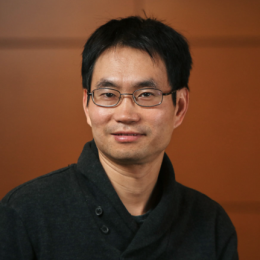Dr. Dali Wang 
Senior R&D Staff ORNL and Joint Associate Professor of Computer Science
University of Tennessee
Friday, September 13, 2019
2:30-3:30pm JDT 410
Abstract:
Destructive teardown evaluation of resistance spot welds is nowadays a mandatory procedure to ensure the integrity and quality of the welds. Supplementary to the labor intensive and costly teardown evaluation, the application of an ultrasonic signal to assess spot weld quality through non-destructive evaluation have attracted strong interests in modern automotive industries. With today’s powerful Infrared systems and signal processing units, we can rapidly improve the reliability and detectability of weld quality. In this study, we present an autonomous deep computing framework to analyze raw videos from infrared systems and to predict weld nugget shape and size with unprecedented accuracy and speed. In a comprehensive training and testing experiment with 90 videos (over seven sets of welding material stack-ups), a new method is developed to assembly sufficient datasets for neural network training. Our framework successfully predicts all the effective starting time with an error bar of less than 0.02 seconds, and all the active nugget shape with an F1 score ranges from 0.83-0.94. With the parallel computing on an Nvidia DGX station, the total training time takes less than 10 minutes for each set of welding material stack-up. The real inference time of an individual dataset (with 30 frames) takes about 0.005 seconds without considering the input IO time. The procedure and methods developed in the study can be applied to more image-based weld property detection as well as other manufacturing processes. Furthermore, our well-trained framework takes limited memory resource (2.3 MB) and is suitable for embedded microprocessors (such as NVidia Jetson) for in-situ welding quality control within an intelligent welding framework.
Bio:
Dr. Wang is a Senior R&D Staff and a member of Artificial Intelligent (AI) initiative at Oak Ridge National Laboratory (ORNL). Dr. Wang is also a Joint Associate Professor of Computer Science at the University of Tennessee, Knoxville. Dr. Wang has research interests in AI, high-performance computing (HPC), machine learning for data science, Earth and environmental system modeling, advanced manufacturing, developmental biology, and geographic information system. Dr. Wang earned his Ph.D. in Environmental Engineering (computational science focus), MS in Computer Science, and MSC in Computational Science and Engineering, all from Rensselaer Polytechnic Institute, Troy, NY. Prior to ORNL, Dr. Wang was an HPC Infrastructure Manager at the Southeastern Universities Research Association in Washington, DC. Dr. Wang is the author (co-author) of over 95 peer-reviewed publications (papers, data, and software products) and the PI (co-PI) of over 30 funded projects. Dr. Wang is an IEEE Senior Member, an AAAS member, and a Board Member of the International Environmental Modelling & Software Society.